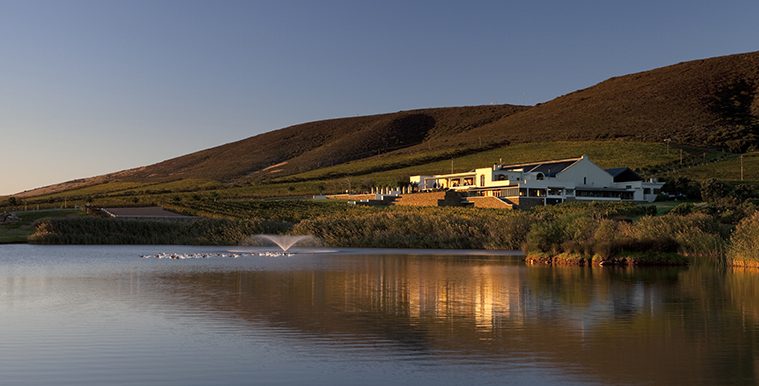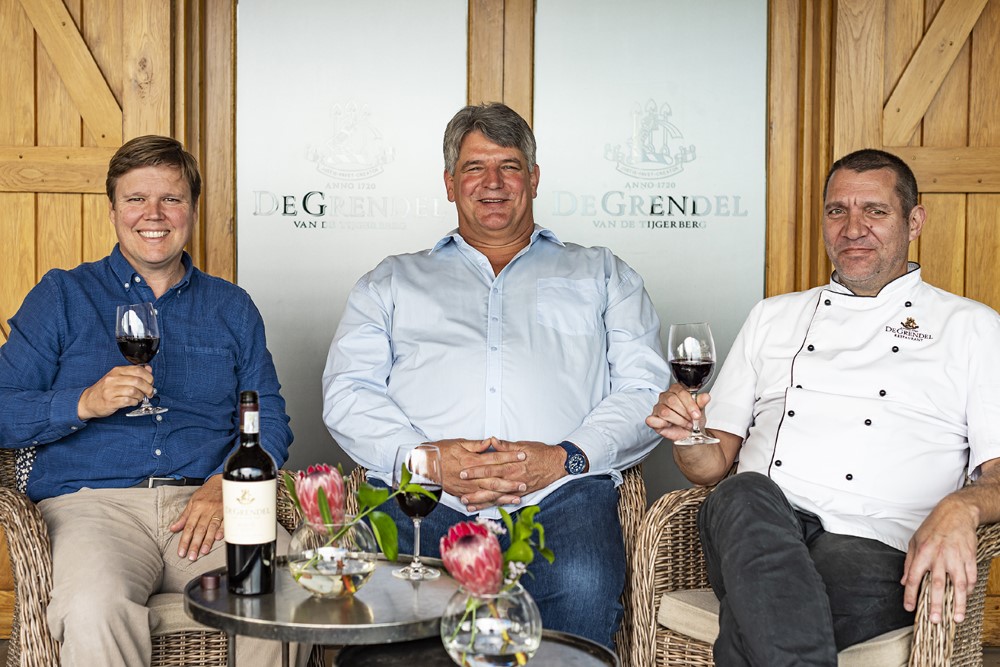De Grendel celebrates its 300th anniversary this year, marking three centuries of a Cape landmark whose story – and that of its fourth-generation owners, the Graaff family – is deeply woven into South Africa’s history.
Renowned for its award-winning wines and its restaurant rated among the best for fine dining in South Africa and Africa, De Grendel has been a working farm since the land on the Tygerberg hills outside Cape Town was granted in 1720. De Grendel today is a leader in sustainable farming and conservation, home to vineyards, a prized Holstein cattle stud, dairy, sheep, horses, fruit, grain, and a conservancy of indigenous renosterveld and game.
De Grendel is marking its tricentennial with a distinctive 300th anniversary seal on all their 2020 vintage wines.
De Grendel’s current owner, the 4th Baronet Sir De Villiers Graaff, said the milestone anniversary was a time for both celebration and reflection.
“De Grendel as a farm is 300 years old and as a family we have been responsible for stewardship of this unique piece of South Africa’s agricultural history for more than a century. Each generation has made its own mark and brought something new to the farm, as we strive to conserve the legacy and the environment while also looking to the future.
“Our vision and our responsibility is to continue building De Grendel as a sustainable and successful enterprise at the centre of a community of all who live and work here, with some of the staff having roots on De Grendel stretching back five generations,” he said.
The name De Grendel, originally De Grendel van de Tijgerberg, means “latch” or “lock” in old Dutch, signifying its position as the gateway for farmers and traders from Cape Town over the Tygerberg hills to the inland settlements of Durbanville and Stellenbosch.
Once a remote outpost of Cape Town, De Grendel today is a rural retreat in the midst of urban sprawl, stretching out over some 300 hectares of the fynbos-covered Tygerberg Hill at 350m above sea level, commanding sweeping views across Table Bay to Table Mountain, and is the entry point to the Durbanville wine route.
One of Cape Town’s oldest farms, the land was granted in 1720 to prosperous businessman Claas Meyboom and was bought in 1891 by David De Villiers Graaff, laying the foundations of a family legacy of stewardship of De Grendel and a defining role in the business, political and agricultural landscape of South Africa.
From humble beginnings as a farm boy from Villiersdorp who went to work at his uncle’s butchery in Cape Town at the age of 11, David De Villiers Graaff became a leading politician, entrepreneur and farmer, knighted as the first Baronet of Cape Town by King George V in 1911 in recognition of his role in the formation of the Union of South Africa.
He took over his uncle’s business at the age of 18 and, realising the potential of the new technology of refrigeration, founded Imperial Cold Storage and built it into one of the largest cold storage companies in the world.
Setting in motion the family’s long involvement in public service, Sir David led the modernisation of Cape Town as its mayor from 1890 to 1892, playing a key role in bringing electricity to the city and the building of the Foreshore by reclaiming land from the sea, and he was the main investor in the Table Mountain Aerial Cableway.
He was one of a number of prominent businessmen who played an important part in politics in the years leading up to the unification of South Africa in 1910 and afterwards, serving as a member of the old Cape Parliament and the Parliament of South Africa after union and as a Cabinet minister in both. Graaff also served as South Africa’s commissioner to London and was a delegate to the Treaty of Versailles at the end of World War I.
At the same time, his growing interest in farming and the breeding of Arab horses led him to buy De Grendel in 1891 where he built the Koetshuis stables that now give their name to De Grendel’s flagship Sauvignon Blanc, and later began acquiring the Friesland cattle that would become a long-standing championship herd.
Sir David built the Herbert Baker-styled De Grendel manor house in 1898, a Victorian home with distinctive Cape Dutch gables that is now home to the fourth and fifth generations of Graaffs.
His legacy of impeccable character and remarkable achievements is honoured by De Grendel in the super-premium red wine Sir David Graaff 1st Baronet of Cape Town, made from mature vines that produce wine of exceptional quality made to age for over 20 years and presented in distinctive packaging that tells the family history, “in remembrance of the responsibility bestowed upon his children by his legacy”.
Graaff’s eldest son De Villiers, fondly known as “Div”, succeeded to the baronetcy on his father’s death in 1931. Decorated and awarded an MBE for his military service in World War II, he went on to lead the United Party as the official opposition in Parliament for 21 years.
The longest-serving opposition leader in South African politics, he led the opposition to the National Party governments of three apartheid prime ministers – JG Strijdom, Hendrik Verwoerd and BJ Vorster.
Known as “the first gentleman of politics”, he was a farmer at heart and introduced Merino sheep to De Grendel, being named Agricultural Man of the Year in 1980 for his modern scientific management of the farm and the prized Friesland stud.
The name De Villiers has been given to the eldest son in each generation since 1846 when the first Sir David’s father Nort Graaff, a farmhand in Villiersdorp, secretly married Anna Elizabeth de Villiers, daughter of the prominent farmer and government official Pieter de Villiers, after whom the town was named. De Villiers had objected to the romance, leading the young lovers to elope and when he finally accepted the marriage, he insisted that male offspring should bear the names of both De Villiers and Graaff.
Sir De Villiers Graaff died at De Grendel at the age of 85, in 1999, and was succeeded by his son David De Villiers Graaff as 3rd Baronet and owner of De Grendel.
The farm’s history shows that grapes were grown there in the early years but wiped out by the phylloxera plague of the 1890s and it was Sir David who returned viniculture and winemaking to De Grendel in 2000.
Like his father and grandfather before him, Sir David was a politician, serving as Member of Parliament for Wynberg and later as Deputy Minister of Trade and Industry in the government of FW De Klerk in 1991.
Retiring from politics after the 1999 elections, he turned his attention to farming and injected new life into De Grendel, planting 100 hectares of vineyards and establishing a new wine cellar.
The first 1800 cases of De Grendel sauvignon blanc, merlot and shiraz were made in 2004 by cellar master Charles Hopkins at the Graham Beck cellar and in 2005 he moved to De Grendel to start making wine on the farm in the cellar built to his design.
Hopkins first made De Grendel’s flagship Rubaiyat red blend in 2006, on the request of Sir David to craft a wine that would become a De Grendel icon – and Rubaiyat has achieved that status as a firm favourite of De Grendel customers and a multi-award-winner.
The wine was named after the Rubaiyat of Omar Khayyam, the 11th century Persian poem held dear by Sir David, and so each vintage features a different quatrain from the poem on the label and is composed of a quartet of varietals, Cabernet Sauvignon, Petit Verdot, Merlot and Cabernet Franc.
Many of De Grendel’s wines are linked to the Graaff family and its history, starting with the “grande dame” Winifred, a white blend launched at the cellar’s opening and named after Sir David’s wife, Sally, Lady Graaff, whose first name is Winifred.
Launched for the winery’s 10th anniversary, Amandelboord Pinotage honours the 2nd baronet, Sir De Villiers Graaff and his love of pinotage from the Durbanville ward, and his grandson and namesake, 4th baronet Sir De Villiers Graaff’s memories of horseriding through the farm’s almond orchard with his famous grandfather.
The special vineyard selection Koetshuis Sauvignon Blanc, a Top 10 Sauvignon in 2019, is so named because its vineyard is planted next to the original stables and coach house built by the first Baronet Graaff.
Grapes for De Grendel wines are sourced mainly from the estate but Hopkins also seeks out unique areas for the particular characteristics they bring to certain cultivars, and in 2012 De Grendel released the first of its Op Die Berg wines, a Pinot Noir grown on the Graaff family farm in the Witzenberg mountains of Ceres, a high altitude cool continental climate that facilitates gradual ripening for concentrated, elegant, terroir-driven wines.
The Ceres plateau vineyards also produce Op Die Berg Chardonnay, with the 2020 vintage just released, and Hopkins is looking forward to releasing a single-vineyard Shiraz from the site in the next few years.
Hopkins has also long been intrigued by the unique cool maritime climate of the Elim area near Africa’s southern tip at Cape Agulhas and its potential to consistently produce Shiraz in the sought-after spicy black pepper rotundone style. His passion project came to fruition in 2016 with the release of the first vintage of De Grendel Elim Shiraz.
Now in its third vintage, the Elim Shiraz has attracted accolades from the beginning and in 2019 made history by earning Hopkins and De Grendel’s first five-star rating in the Platter’s South African Wine Guide 2020.
“It has been a privilege to have worked with Sir David from the start to establish vineyards and winemaking at De Grendel. In two decades since the first vines were planted, we have achieved incredible success as a relatively young winery, and that is due to the excellent terroir here on De Grendel and the other properties were are fortunate to source grapes from.
“Our success is also, primarily, due to the absolute commitment of Sir David and Sir De Villiers to producing wines of the highest quality by investing in quality from the start and constantly striving for growth and improvement,” Hopkins said.
Sir David Graaff died in 2015, having set De Grendel firmly on course as one of South Africa’s leading wine producers while continuing the agricultural prowess of De Grendel in the other areas of its agribusiness.
His heir Sir De Villiers Graaff, the 4th baronet, had moved to De Grendel with his wife Lady Gaedry Graaff and four children in 2011 and started a new path of innovation for the estate and expansion of the wine business.
Sir De Villiers opened the De Grendel Restaurant in 2012, a fine dining experience showcasing the farm and family heritage and framing the magnificent Table Mountain view in a cool, contemporary setting. Head chef Ian Bergh has attracted international acclaim and awards for luxury fine dining with his menu drawing on farm produce and ingredients from local artisan suppliers to present an inventive, modern take on classic Cape cuisine.
De Grendel Restaurant was placed in the Top 10 for fine dining in Africa in the 2019 TripAdvisor Travellers’ Choice Awards.
Sir De Villiers also enticed cellar master Hopkins into cider making, a natural progression from the family’s long involvement in apple farming, and Three Spades Cider was introduced in 2018 as a premium craft cider bearing the farm’s historic emblem of three spades.
He has also introduced commercial blueberry farming to the estate and wild game to the conservation area, while working to achieve greater sustainability for De Grendel through environmental measures including a reverse osmosis plant to alleviate Cape Town’s water shortage and long-term drought prospects.
A solar photovoltaic plant commissioned in 2015 powers 30% of De Grendel’s operations, leading to cost savings and a reduced carbon footprint, and further enhancing the farm’s carbon-negative status. De Grendel has long been a net carbon sink, with assessments showing that its natural vegetation removes more greenhouse gasses from the atmosphere than are released by the farm operations.
The Graaff family’s commitment to the public good and the natural environment is reflected in a long history of philanthropy, with the first Sir David having set an early example of giving back, especially to support education and funding the De Villiers Graaff High School named after him in Villiersdorp.
The current Sir De Villiers shares his ancestor’s passion for education and empowerment, and De Grendel’s farmworkers are involved in a shared-ownership basis while the farm invests in the education of workers and their children with funding for school and tertiary education, transport and school after-care. Sir De Villiers chairs the Waitrose Foundation which funds upliftment of farmworkers, and the family established the Montrose Foundation to address substance addiction and abuse in youth from disadvantaged communities.
“All of us at De Grendel have a shared history, a shared responsibility and a shared future – that is what drives us to improve and grow, to deliver an outstanding experience for visitors and customers, and a sustainable future for our children and their children,” said Sir De Villiers.






